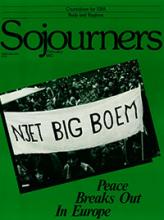Only one day in the month of a monthly magazine is more frenzied, more demanding than the day before deadline, and that is the day that follows. Neither is a day to be gone from the office.
The phone call came at that worst of all possible times: Julia Esquivel is in town for two days; she says she would especially like to meet someone from Sojourners.
I had first heard her name more than a year before, when I was putting together our December, 1980 issue on the church in Central America. A close friend who had spent time in Guatemala mentioned that he had some of Julia Esquivel's poetry. Would I be interested in looking at it?
I remember being gripped by the poems' words and images. I discovered what felt like the most authentic touch that I had had with the pain and tragedy of the people of Central America, and I hoped someday to meet the woman behind the words.
So when the phone call came, I knew I had to meet her. My first impression was one of surprise that a woman so outspoken and courageous could be so small and humble. I knew that Julia had been the editor of the banned Guatemalan magazine Dialogo, had received several threats on her life, and was now living in exile. I met her at the U.S. Jesuit Conference, where she was sharing her concern for her colleague and co-editor, Luis Pellecer. Pellecer, a Jesuit priest who served as a chaplain in Guatemala City's slums, was beaten and kidnapped last June. After keeping him in captivity for almost four months, the Guatemalan government began to use him as its instrument, arranging press conferences in which he recanted his work for the liberation of the poor and attacked Catholics involved in such work. Many believe that Pellecer is the first confirmed example in Central America of the use of sophisticated methods of psychological control.
Read the Full Article

